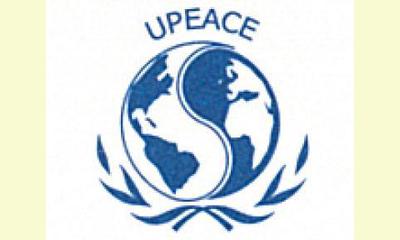|
|
University for Peace Starts Centre in The Hague
un article par University of Peace
The University of Peace (UPEACE), headquartered in Costa Rica, has now started a new centre in the Netherlands. The Hague, International City of Peace and Justice, is the eminent location for further outreach to the Netherlands and the European Union.

click on photo to enlarge
During its thirty years of existence, this UN-mandated university has developed a variety of masters (MA) and capacity building programmes in the fields of peacebuilding and conflict studies, as well as courses and trainings for students and professionals from all over the world. UPEACE already has established centres in Addis Ababa, Belgrade, Bogota, Manila, Montevideo and Seoul.
As of January 2012 the new UPEACE Centre The Hague, in short: UPEACE The Hague, is housed at the Academy Building of the Peace Palace, next to the Hague Academy of International Law. UPEACE The Hague will focus and education and research at the forefront of peace studies, closely cooperating with academic and policy-oriented institutions in the Hague region. UPEACE The Hague will initially advance three interdisciplinary areas where it can be innovative and complementary: Peace and Conflict Studies; Water and Peace; and Urban Peace & Security. In addition, UPEACE The Hague will substantially strengthen peace education in the Hague region by organizing professional trainings, lectures, seminars, and workshops. Educational and research programmes will be characterized by the interaction between theory and practice, with particular attention to policy implementation: the Centre will therefore be appealing to both academics and professionals.
UPEACE The Hague builds on existing knowledge and expertise from the UPEACE global network. It will sustain commitment to the global peace agenda by creating new opportunities for a breakthrough in regional peace processes and peace dialogues. This will be realised in close cooperation with institutes in the Hague and surroundings, such as the Carnegie Foundation, The Hague Institute for Global Studies, Leiden University College. The Hague, the International Institute of Social Studies, The Hague University
of Applied Sciences, and UNESCO-IHE. In this way, UPEACE The Hague endeavours to develop as the European UPEACE expertise and knowledge centre - a process in which UPEACE alumni are involved as well.
UPEACE The Hague is governed by the Board of the Dutch foundation "Alliance for the University of Peace", chaired by Marius Enthoven (MSc), former Director-General, European Commission.
On 20 September 2012, UPEACE The Hague will officially be launched during a conference at the Peace Palace, entitled "Peace for Humanity in the 21st Century."
|








|
DISCUSSION
Question(s) liée(s) à cet article:
Peace education at the United Nations, how does it work?
* * * * *
Commentaire le plus récent:
[Editor's note]: This is a continuation of the article by Oliver Rizzi Carlson, Culture of Peace Advocacy at the UN.
In the historic, international hallways of the United Nations, multitudes of people from every country in the world are busy going to meetings, addressing agenda items relevant to their governments and organizations, and making contacts. Lists are set, events are scheduled… agendas are largely inherited and predictable, presenting many issues and objectives that people have been working toward for a long time: goals of peace, prosperity, equality, justice. And yet, agendas still provide an incredible space to speak about the process by which those desires are achievable. Most of the time, documents just fall short of that transformative element, seeming to be longing for it. Peace education is seldom included; but once mentioned, it is immediately recognized for its relevance and importance. The “whats” are many and detailed in the world of international conference-making; the expertise of the “how” is a welcome newcomer to the discussion.
Advocating for peace education in the midst of governments, international organizations and even NGOs, few of which promote peace education directly, appears as a lonely journey. But as soon as one starts to speak about it, people’s eyes light up, new ideas and proposals flow, and diverse groups gather to talk about it further – it seems the momentum is building very quickly to create a real consciousness about peace education at the international and institutional level. Many also say it is “refreshing” to see youth doing this work. . ... continuation.

|
|








